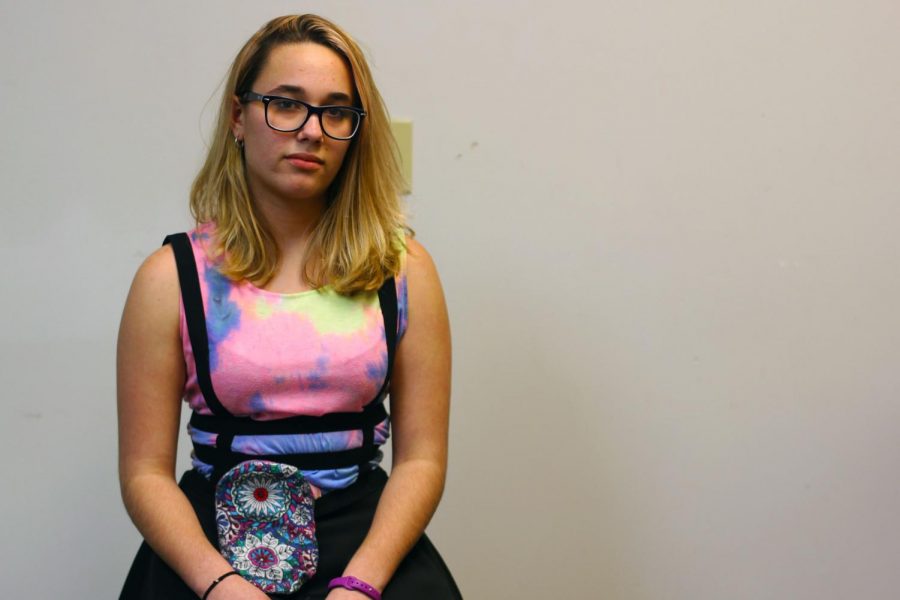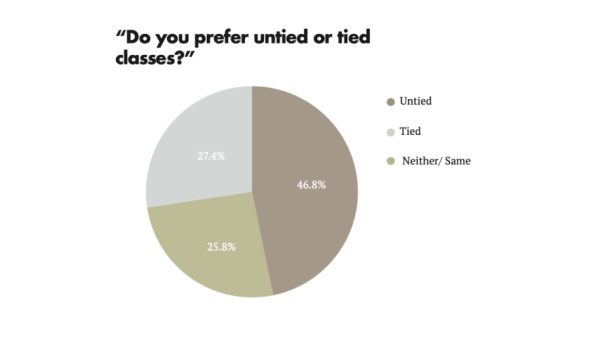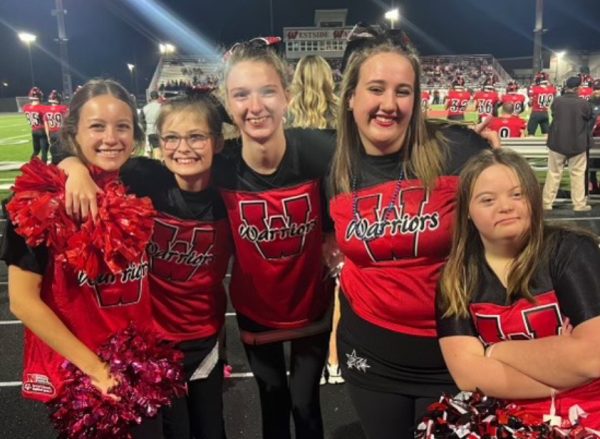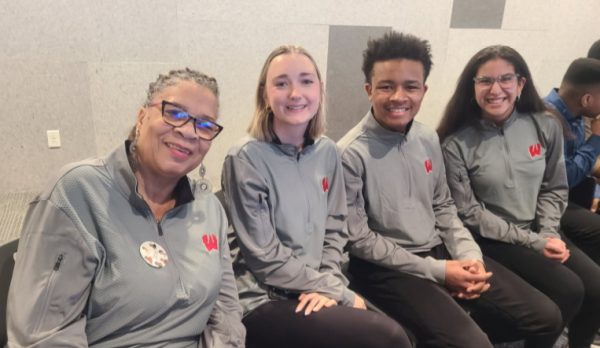A True Warrior
Freshman speaks on troubles with ostomy
Paige Vaccaro poses at Westside for this article. Photo by Emma Miller
For freshman Paige Vaccaro, seventh grade wasn’t just about finding new friends and dealing with a new schedule. It was about survival. Due to medical complications with her colon, Vaccaro had to receive an ostomy pouching system. This is a device that collects waste in the body, a function the colon usually performs.
At the beginning of her seventh grade year, Vaccaro said she started having to go to the bathroom 20 times a day, just while at school. She also noticed blood in her stool. Soon, she got in contact with doctors, but they couldn’t immediately figure out what had happened to her. Vaccaro blacked out several times due to all the energy she was losing. Eventually, the doctors realized Vaccaro had a parasite called cryptosporidium as well as a disease known as ulcerative colitis. Cryptosporidium is often found in water and causes a diarrheal disease, while ulcerative colitis is an inflammatory bowel disease. For Vaccaro, the effects were serious. The parasite destroyed her colon.
“They told me that my colon was like a dead eel,” Vaccaro said. “How bad I had it, I should have died.”
Vaccaro’s colon needed to be fixed. She started receiving a drug called Remicade through infusion treatment first. In infusion treatment, medication is given through an intravenous line (IV) every few weeks. It didn’t work for her. After a while, a doctor approached her with another solution. It was called a j-pouch.
“[The doctor] comes in and sits in front of my bed and calmly says, ‘I can give you back your life with six months,’” Vaccaro said. “I was immediately, like, yes, do it.”
In this operation, the colon is removed and doctors use the intestines to create a j-shaped “pouch” that can act as a reservoir for bodily waste and is eventually connected to the anus. Vaccaro underwent the operation, but she started hitting fevers of up to 100 degrees even while on antibiotics and was bleeding. Her mother told the doctors that something was wrong, and when they finally examined her, she had to go in for surgery again immediately. They found that her j-pouch had failed and died. They put another j-pouch in, but this one died too. What should have been a five-day stay lasted for almost four weeks, her longest continuous stay in the hospital. Vaccaro was in the hospital for three months altogether. She received three j-pouches, and all of them died. All of this took a serious toll on her.
“I was gray-colored,” Vaccaro said. “I was sickly … I remember, my friend, she came in [and] it was her first time seeing me. The first person after seeing me really gray, really grisly, and she just cried. It was terrible.”
While Vaccaro was in the hospital, she lost 30 pounds. Her mother, Cristy Vaccaro, said it was incredibly hard to watch her daughter’s health change so much.
“She was a kid that couldn’t even walk around for 10 minutes without being so exhausted she’s having her legs wobble and crumble underneath of her,” Cristy Vaccaro said.
As a result of her operations, Paige Vaccaro has only eight feet of intestines left. She could still have another j-pouch if she wanted, but if it didn’t work, she would be out of other options.
After her failed operations, her mother told the doctors to stop trying with the j-pouch. Paige Vaccaro then started using an ostomy pouching system. An ostomy is made up of a wafer that sticks on the skin through adhesive and connects the stoma, an artificial opening in the body, to a pouch that collects waste. Her doctor gave her some products manufactured by a company called Hollister to try. Yet again, it didn’t work. Because of her skin type, Paige Vaccaro was having to use 15 different kinds of adhesives to make the wafer stick on, and it would still fall off. At one point, a nurse gave her all the supplies she had available and it didn’t work. The nurse only had Hollister products.
At this point, Paige Vaccaro switched doctors. Instead of going to Children’s Hospital, she went to University of Nebraska Medical Center (UNMC). She also switched to using products from a company called Coloplast. Finally, it worked. Paige Vaccaro only had to use three products at the most to get the ostomy wafer to stay on. Because of all the products she had had to use previously, fungi started growing on her skin. Luckily, the switch in products saved it from spreading even further, and it was able to be treated. Still, the recovery process was far from over, and some aspects of Paige Vaccaro’s health will never be fixed. She now has short bowel syndrome, which is a malabsorption disorder caused by the removal of parts of her intestines. It can result in dehydration, malnutrition and weight loss. Cristy Vaccaro said that the whole experience was very difficult to get through.
“It was a nightmare of a life that I don’t care to ever have to go back to,” Cristy Vaccaro said. “Unfortunately, with Paige’s disease, what she has left, we’re literally a step away from having to have that again. She is a medically compromised child.”
Just as important as the physical recovery was Paige Vaccaro’s mental recovery. She said she credited friends and family with giving her hope during her hospital stay and afterwards, especially her mother.
“I am blessed to have her,” Paige Vaccaro said. “She was a [medical assistant]. She knew what ostomies were, because when she was younger she worked in a nursing home. Older people had that stuff.”
In addition to her knowledge about ostomies, Cristy Vaccaro has supported Paige in other ways. Since October 2016, she and her husband have been trying to get Paige Vaccaro on a Medicaid waiver that would help her with expenses once she can no longer be on their insurance. The ostomy supplies, along with medications that Paige Vaccaro needs just to survive, can cost several thousand dollars a month. The Vaccaros have gone through multiple court hearings, and in December of 2018 they appeared before the Nebraska Supreme Court. The court ruled that if Paige Vaccaro meets the criteria necessary to get on the waiver, the state of Nebraska must reimburse her medical expenses from October of 2016 until the present. According to Cristy Vaccaro, this is unheard of, partly because most people don’t get as far with their lawsuits.
“We are the first people that have fought this hard, this long,” Cristy Vaccaro said. “Most people have given up by now. We can’t afford to give up.”
Paige Vaccaro said her family’s support has been incredibly important, and her friends helped her too. Many came to visit her while she was in the hospital.
“I had one friend that came almost every day after school,” Paige Vaccaro said. “She sat right next to me in a rocking chair doing her homework. I think the thing that kept me kicking was probably my friends and family.”
After being released from the hospital, the Vaccaro family also got a puppy, which Paige Vaccaro has now trained so she can be her service dog. She said therapy dogs really helped her while she was in the hospital, and now her two-year-old puppy, Cedar, helps her too.
“She knows when my bag is really full,” Paige Vaccaro said. “She’s like, ‘Hey, go to the bathroom.’ We’re going to start training her with dehydration because I get dehydrated so fast.”
Cedar is almost ready to come to school with Paige Vaccaro, according to Cristy Vaccaro. Cedar has passed the Canine Good Citizen test already and simply needs to master all her tasks. She already goes almost everywhere except school with Paige Vaccaro. Cristy Vaccaro said that the psychological help Cedar provides is important too.
“That has been some of the best counseling Paige could ever have had,” Cristy Vaccaro said. “Having a dog by your side through the darkest of times that she’s ever had is huge.”
Another thing that Paige Vaccaro said has helped her was attending a camp called Youth Rally last summer. It is a camp for kids who have had ostomies or urostomies and have other bowel-related medical conditions.
“[The camp] changed my life,” Paige Vaccaro said. “I was normal with that group … It lightened me up and made me realize I’m not alone in this. I can do it.”
In Omaha, there are no support groups for teenagers who have ostomies. The majority of people who have ostomies are the elderly, and it is not common in children and teenagers. Paige Vaccaro said she is currently the only person in the Westside district who has an ostomy. According to Paige Vaccaro, the camp inspired her not to be shy about her ostomy. Because ostomies are not as common in teenagers, Paige Vaccaro said she was also inspired to reach out and talk about her experience. She and her mother contacted Coloplast, the company that produces the ostomy products she uses, about being a spokesperson. Cristy Vaccaro said her daughter has an important message to share.
“She really wants to share her story,” Cristy Vaccaro said. “It’s okay to be different. It’s okay to not be a normal teenager. This has given her somewhat of a life back. It might be compromised, but it’s still a life.”
Paige Vaccaro was recently hired by Coloplast and is planning on going up to St. Paul, Minnesota to meet some representatives in April. She will also go to a conference where she will share her story and change her ostomy bag in front of a hundred people.
“I’m nervous, but I’m very excited,” Paige Vaccaro said.
At a conference in June, Cristy Vaccaro will speak alongside her daughter about dealing with a disease like short bowel syndrome.
“They want a mother [and] daughter speaking, so I’ll be speaking with her more on the parental side of the struggles of watching your child deteriorate,” Cristy Vaccaro said. “[To see her] shrivel up like a beautiful rose that’s now drying up and dying off is really hard as a parent. You’re very helpless.”
Paige Vaccaro said she wants to be a spokesperson for Coloplast because she wants to help people find the right product. She said that Coloplast changed her ostomy experience. Paige Vaccaro has already given advice to some people she knows about dealing with an ostomy, and she said she wants to continue to help people.
“It’s an amazing feeling knowing that you helped someone and made their life better,” Paige Vaccaro said.
Living with her ostomy is not always easy, according to Paige Vaccaro. Along with the physical challenges, there are mental challenges from her experiences as well.
“You have your good days, you have your bad days,” Paige Vaccaro said. “You just want to break down and cry some days. Some days you just want to fight everybody … But it’s better than dead. You’re living here and you’re standing before us and you can tell your story.”
Paige Vaccaro still experiences trauma from all her time spent in the hospital.
“I can’t walk in a hospital without freaking out,” Paige Vaccaro said. “It’s a wound that will never heal. My friend went into the hospital recently and my mom was, like, ‘You should really go see her,’ and I can’t. I can’t walk in those doors because of how many times I had to be admitted and be sitting in a hospital bed for months.”
However, Paige Vaccaro said she tries to work past days that are harder than others. She played volleyball before her ostomy and continues to do so now with the Omaha Suburban Athletic Association. Although Paige Vaccaro said it was difficult to get back into volleyball at first, she has adjusted, especially with the support of her coach. She has a special ostomy cover that protects her pouch in case she dives for a ball.
“When you sign up for something, you have to go for it,” Paige Vaccaro said. “I enjoy volleyball. It’s a workout for me that I know I can do and I want to be pushed. I am not afraid of what I’ve got. I will hit the ball head on.”
Mainly, Paige Vaccaro stressed the importance of looking on the bright side. She said that while things may be bad right now, they can always get worse.
“If you just look at the bad stuff, you’ll never get anywhere,” Paige Vaccaro said. “If you look at the good stuff, you’ll get there.”
Cristy Vaccaro also emphasized Paige’s ability to stay strong in difficult times.
“She’s a warrior,” Cristy Vaccaro said. “Without a doubt, she’s an absolute warrior. She has gone through more than what some adults will ever have gone through.”
With all that she has experienced, Paige Vaccaro said she is confident in who she is. Her ostomy may make her different from most other teenagers, but it’s simply a part of her identity. Paige Vaccaro said she wanted other people to learn to accept themselves no matter what and issued a challenge to those who judge others without learning about them first.
“If you’re going to judge me, judge me hard,” Paige Vaccaro said. “Bring it on … It’s my life.”
Your donation will support the student journalists of Omaha Westside High School. Your contribution will allow us to purchase equipment and cover our annual website hosting costs.

Hi, my name is Reese Pike! I am a Copy Editor for Lance this year. I am currently a senior and this is my fourth year on Lance. If you have any questions...
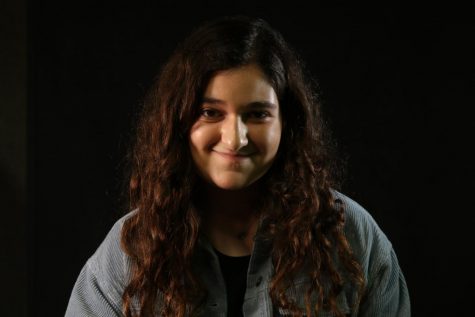
Hi, my name is Emma Miller! I am a Feature Editor for Lance and Social Media Coordinator for the journalism program this year. I am currently a senior...



